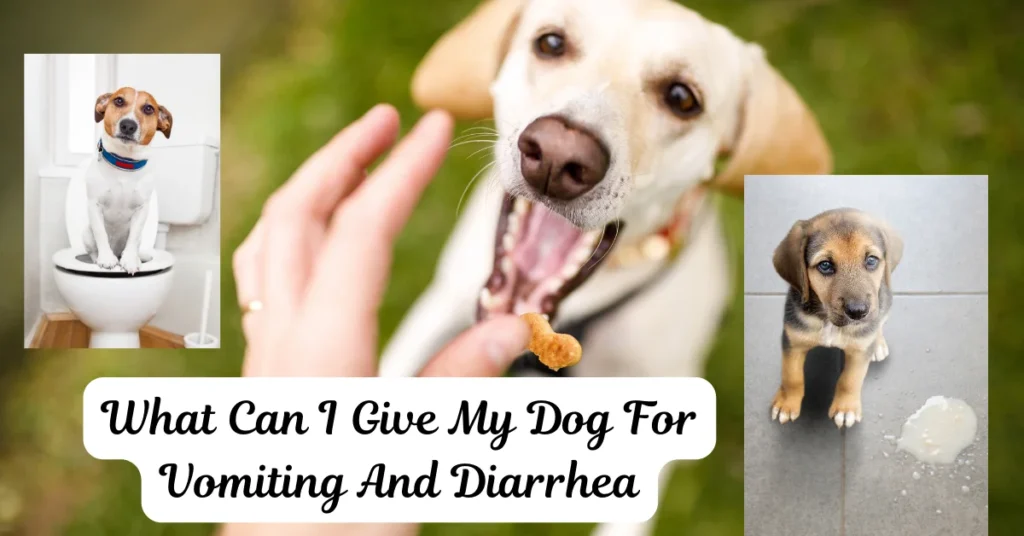If your dog is suffering from vomiting and diarrhea. It is important for you to consult a veterinarian for an accurate diagnosis and treatment plan. Avoid giving over-the-counter medications without professional guidance, as they can be harmful to your pet. The answer to the question What Can I Give My Dog For Vomiting And Diarrhea is to focus on providing boiled chicken rice, and plenty of fresh water to prevent dehydration. Provide fresh water until you can seek veterinary care for your pet’s checkup.
You can feed your dog simple foods like boiled chicken and rice. Furthermore, you can use a special diet recommended by the vet for sensitive stomachs. The vet may also give fluids to help with dehydration caused by vomiting and diarrhea. They might prescribe medications to ease nausea and make the stool firmer.
It is not generally recommended to give your dog medicine for diarrhea without consulting a vet. Medications can have side effects or interactions that may worsen your dog’s condition. It is important to get professional guidance to ensure the right treatment and dosage for your pet’s specific situation.
The home treatment can be worse for your dog or cat. It can be a cause of the increase in the issue. When the dogs are facing the issues of vomiting and diarrhea, you should have to consult a vet.
Signs that the dog needs the vet:
Our dogs can not tell us exactly how they are feeling. So it is important to watch for signs that they might be under the weather. While a little vomiting or diarrhea is not always a huge cause for concern. But sometimes you should want to take your pet to the vet right away.
If your pet is throwing up a lot, pooping more than usual. This means they have lost their appetite for food and water, these could be signs of something more serious. Also, pay attention to their energy levels. If your pet seems uncomfortable or in pain, whining or crying. It is best to err on the side of caution and get them checked out by a vet.
- Seek veterinary attention if your pet has repeated vomiting or diarrhea episodes.
- Vomiting for more than 12 hours or diarrhea lasting over 24 hours requires professional evaluation.
- Look out for signs of lethargy, loss of appetite for more than one meal, or blood in vomit/stool.
- Check for visible parasites or signs of pain (yelping, crying, resisting touch).
- Monitor hydration by gently pinching the skin; if it stays tented, your pet might be dehydrated.
- When in doubt, always consult a veterinarian for proper diagnosis and treatment.
Reasons behind the dog throwing up or loose stool:
These are some of the usual and common reasons behind the dogs’ upset stomach. You must have noticed these issues and concerns to the vet as soon as possible. These reasons are given here:
- Nosy Noshing
- Food Fussy Felines or Canine Cuisine Concerns
- Stressed Out Stomach
- Pesky Parasites
- Mild Bug Battles
Certainly, here are some more serious causes of vomiting and diarrhea:
- Ingestion of toxins like chocolate, pesticides, or certain plants.
- Metabolic disorders affecting organs such as the liver, kidneys, pancreas, or gall bladder.
- Severe infections like Parvovirus in dogs.
- Hormonal imbalances or disorders.
- Presence of foreign objects that could become lodged in the stomach or intestines, such as a toy ball.
- Gastrointestinal ulcers.
What will make my pet feel better?
Your vet may recommend various treatments based on your pet’s needs. Such as probiotics to restore gut health or anti-inflammatory medications for gastrointestinal inflammation. Regular monitoring and follow-up appointments with your vet ensure the best care and recovery for your furry friend.
- A short fasting period (for adult pets) to rest the digestive system.
- Feeding a bland diet like plain chicken and rice or a prescription diet for sensitive stomachs.
- Administer fluids at the vet’s clinic to restore hydration and electrolyte balance lost through vomiting and diarrhea.
- Prescribing medications for nausea and to firm up the stool.
- Providing specific treatments for underlying causes, such as antibiotics or dewormers.
Remember, avoid giving human medications to pets without vet approval, as they can be harmful. Follow up with your vet if symptoms persist.
FAQs:
What can I give my dog has diarrhea and vomiting?
Vets often suggest giving your pet plain chicken and rice or a special diet for sensitive stomachs. It offers fluids at the clinic to rehydrate and balance electrolytes lost from vomiting and diarrhea. Moreover, it gives medications to reduce nausea and make the stool firmer.
What medicine can I give my dog for vomiting and diarrhea?
Most often you have to contact the vet for the treatment of the dog suffering from diarrhea and vomit. But if you want to give some medications properly, then give Loperamide (Imodium®). It’s usually safe for your dog if the medication is dosed at 1 mg per 20 pounds of body weight but give only one dose. If the diarrhea persists, get in touch with your vet.
What is the first aid treatment for vomiting and diarrhea?
Encourage your pet to take small sips of water frequently. Drinking water helps replenish lost fluids from vomiting and diarrhea. If these symptoms persist, consider giving them a rehydration product to replace lost salts and minerals.
Can I give my dog anything for an upset stomach and diarrhea?
You can make water more appealing by adding a splash of broth. Additionally, consider other foods like plain yogurt with active cultures, 100% pumpkin puree, boiled potatoes (without skin), and cottage cheese to help soothe your dog’s upset stomach.
Conclusion:
This article is related to the Dog suffering from Diarrhea and vomiting. I have almost discussed all the parts through which you can determine the health of the dog. The boiled chicken and rice are the best foods ever for the dogs when it is suffering from the given diseases. Be there for more recent updates according to the problems of your furry friends.
Must Read This Article: When To Cut The Dog Nails

